Filter by
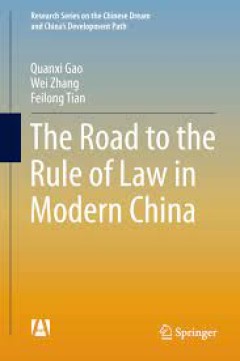
The Road to the Rule of Law in Modern China
This book is a grand review of the centurial development of rule of law in China. It covers the most important issues in this area and presents “political constitution,” a new interpretative framework that allows the Chinese experience of rule of law to be more fully and correctly expressed. It is especially useful to scholars involved in the study of modern China. The main chapters of this…
- Edition
- -
- ISBN/ISSN
- 978-3-662-45637-8
- Collation
- -
- Series Title
- -
- Call Number
- -
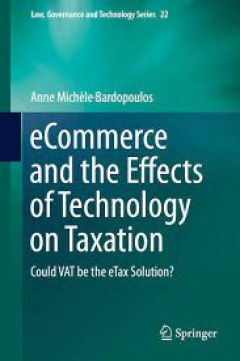
eCommerce and the Effects of Technology on Taxation Could VAT be the eTax So…
This book focuses on the impact of technology on taxation and deals with the broad effect of technology on diverse taxation systems. It addresses the highly relevant eTax issue and argues that while VAT may not be the ultimate solution with regard to taxing electronic commerce, it can be demonstrated to be the most effective solution to date. The book analyzes the application and the effective…
- Edition
- -
- ISBN/ISSN
- 978-3-319-15449-7
- Collation
- 1
- Series Title
- -
- Call Number
- -
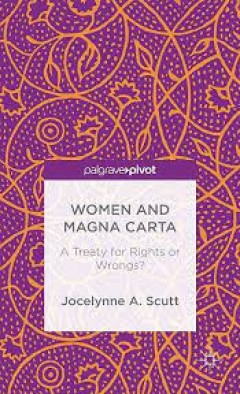
Women and The Magna Carta A Treaty for Control or Freedom
On the eight-hundredth anniversary of the Magna Carta, Women and the Magna Carta investigates what the charter meant for women's rights and freedoms from an historical and legal perspective.
- Edition
- -
- ISBN/ISSN
- 978-1-137-56235-7
- Collation
- -
- Series Title
- -
- Call Number
- -
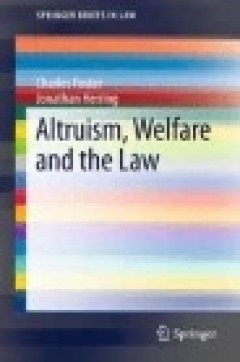
Altruism, Welfare and the Law
This book is an assault on the notion that it is empirically accurate and legally and philosophically satisfactory to see humans as atomistic entities. It contends that our welfare is inextricably entangled with that of others, and accordingly law and ethics, in determining our best interests, should recognise the central importance of relationality, the performance of obligations, and (even ap…
- Edition
- Ed. 1
- ISBN/ISSN
- 978-3-319-21605-8
- Collation
- IX, 82
- Series Title
- SpringerBriefs in Law
- Call Number
- 340.1 FOS a

Vladimir Solov’ëv's Justification of the Moral Good Moral Philosophy
This new English translation of Solov’ëv’s principal ethical treatise, written in his later years, presents Solov’ëv’s mature views on a host of topics ranging from a critique of individualistic ethical systems to the death penalty, the meaning of war, animal rights, and environmentalism. Written for the educated public rather than for a narrow circle of specialists, Solov’ëv’s w…
- Edition
- -
- ISBN/ISSN
- 978-3-319-12775-0
- Collation
- LXX, 435
- Series Title
- -
- Call Number
- -

Historians as Expert Judicial Witnesses in Tobacco Litigation:A Controversial…
Historian Ramses Delafontaine presents an engaging examination of a controversial legal practice: the historian as an expert judicial witness. This book focuses on tobacco litigation in the U.S. wherein 50 historians have witnessed in 314 court cases from 1986 to 2014. The author examines the use of historical arguments in court and investigates how a legal context influences historical narrati…
- Edition
- -
- ISBN/ISSN
- 978-3-319-14291-3
- Collation
- XXV, 453
- Series Title
- -
- Call Number
- 340 DEL h

Fair Reflection of Society in Judicial Systems - A Comparative Study
This book addresses one central question: if justice is to be done in the name of the community, how far do the decision-makers need to reflect the community, either in their profile or in the opinions they espouse? Each contributor provides an answer on the basis of a careful analysis of the rules, assumptions and practices relating to their own national judicial system and legal culture. Writ…
- Edition
- -
- ISBN/ISSN
- 978-3-319-18485-2
- Collation
- 2 b/w illustrations
- Series Title
- -
- Call Number
- -
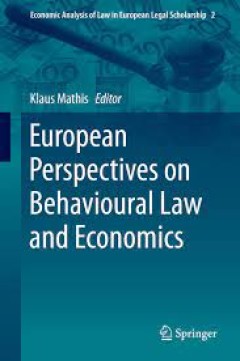
European Perspectives on Behavioural Law and Economics
This anthology highlights the theoretical foundations as well as the various applications of Behavioural Law and Economics in European legal culture. By the same token, it fosters the dialogue between European and American Law and Economics scholars. The traditional neo-classical microeconomic theory explains human behaviour by using Rational Choice. According to this model, people tend to m…
- Edition
- -
- ISBN/ISSN
- 978-3-319-11635-8
- Collation
- 1 b/w illustrations, 10 illustrations in colour
- Series Title
- -
- Call Number
- -
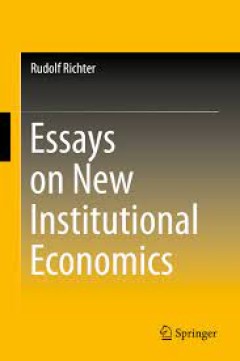
Essays on New Institutional Economics
This collection of essays comprises some of Rudolf Richter’s important contributions to research on New Institutional Economics (NIE). It deals with the central idea, principles, and methodology of New Institutional Economics and explores its relation to sociology and law. Other chapters examine applications of NIE to various microeconomic and macroeconomic issues in the face of uncertainty, …
- Edition
- -
- ISBN/ISSN
- 978-3-319-14154-1
- Collation
- 2 b/w illustrations
- Series Title
- -
- Call Number
- -
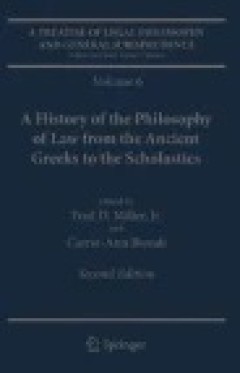
A Treatise of Legal Philosophy and General Jurisprudence: Volume 6: A History…
The first-ever multivolume treatment of the issues in legal philosophy and general jurisprudence, from both a theoretical and a historical perspective. The work is aimed at jurists as well as legal and practical philosophers. Edited by the renowned theorist Enrico Pattaro and his team, this book is a classical reference work that would be of great interest to legal and practical philosophers as…
- Edition
- -
- ISBN/ISSN
- 978-94-017-9885-3
- Collation
- XXVIII, 444
- Series Title
- -
- Call Number
- 340 TRE t
 Computer Science, Information & General Works
Computer Science, Information & General Works  Philosophy & Psychology
Philosophy & Psychology  Religion
Religion  Social Sciences
Social Sciences  Language
Language  Pure Science
Pure Science  Applied Sciences
Applied Sciences  Art & Recreation
Art & Recreation  Literature
Literature  History & Geography
History & Geography